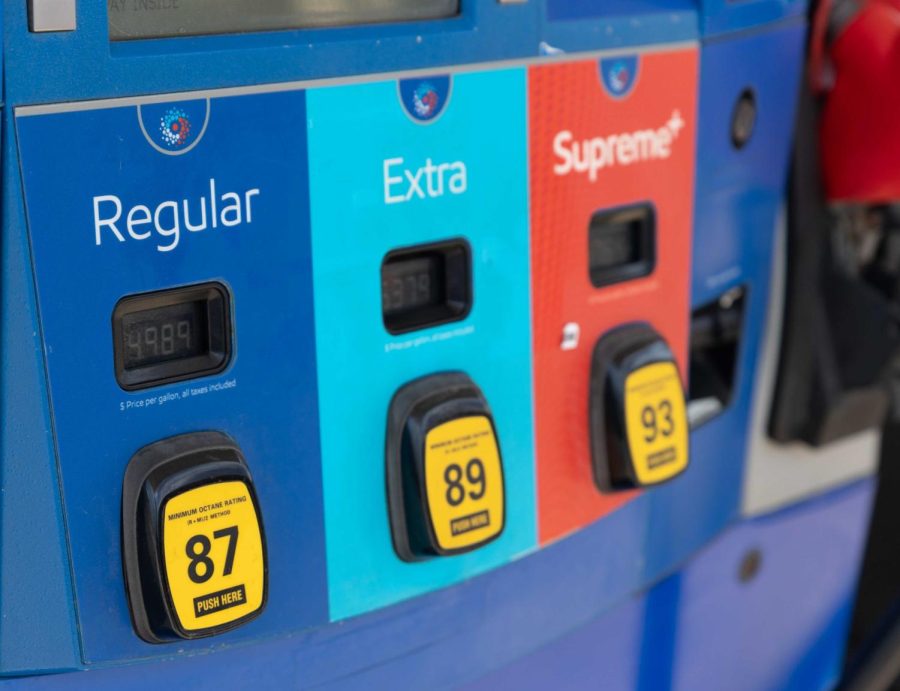It’s no secret that gas prices are on the rise in the United States. In March of 2022, the national average cost-per-gallon of gasoline was $4.331, the highest it’s ever been.
You can’t turn on cable news without talking heads debating why this is the case, and whether or not President Joe Biden is to blame. Increased demand due to relaxing Covid-19 restrictions and the conflict between Ukraine and Russia seem to be two popular hypotheses.
But what tends to be overlooked is that gas is still comparatively cheap in the United States due to our fuel subsidies and low gas taxes.
The price for gasoline in the United States has hovered between an average of about $4 and $4.30 per gallon over the last two months. In countries like Spain, France, Germany and the United Kingdom, the average exceeds $6 per gallon.
Ken Rose, senior fellow with the Institute of Public Utilities at Michigan State University and associate teaching professor at DePaul University, explained why that disparity exists.
“In Europe, in particular, they have high taxes on gasoline,” Rose told The DePaulia. “They’ve done that for a long time. So, consumers are paying more at the pump because of those high taxes they pay on the retail side. We just don’t tax at the same rate as the Europeans do.”
Additionally, the United States government heavily subsidizes oil production. In 2020, the fossil fuel industry received $5.9 trillion in subsidies, according to the International Monetary Fund.
Because of this, gas prices have remained comparatively low in the U.S. when assessed on an international scale. DePaul professor of geography and sustainable urban development, Euan Hague, says that low gas prices, coupled with the idea of American individualism, has made automobiles and gasoline cornerstones of the United States’ culture.
“The United States has long had this love of the relationship with the car,” Hague said. “The idea is, sort of, the private ability to go anywhere you want. You’re not constrained by the train times, the schedule, anything like that.”
Hague is right. Cheap gas is looked at as a birthright in the United States rather than a luxury. Its price somehow dominates national discussion, from CNN to the water cooler, and oftentimes seems like the sole metric to measure economic prosperity or a president’s success.
But gasoline is also an enormous contributor to climate change. Motor vehicles emit carbon monoxide and carbon dioxide when fuel is burned to provide energy. Because of these emissions, cars are the leading mobile source of pollution, according to the Environmental Protection Agency.
This is precisely why European nations tax gas so heavily, so that citizens are encouraged to seek alternative means of transit to gasoline-powered automobiles. The United States has no such carbon tax and continues to subsidize the production of oil, so the demand for alternative transportation is significantly limited here.
“Gasoline consumption is less in those countries that have the higher taxes, so people respond to the prices,” Rose said. “The federal tax here I think is 18 cents per gallon, that’s pretty modest compared to what other countries have. Most economists say that’s the best way to reduce our carbon emissions is to have some kind of carbon tax, which would probably mean a tax on gasoline.”
In fact, public transit has seen a usage boost since gas prices rose in March. In countries where gas is routinely pricier, public transportation is forced to be more robust and convenient to meet demand.
“We’re about to take students to Belgium,” Hague said. “There’s trains every hour on the hour. It’s quite easy to say, ‘Okay, we need to get from here to here. If we miss the 2 o’clock, we’ll get a cup of coffee and get the 2:45.’ The provision of the service is so much higher.”
A long-term shift in transportation demand in the United States could vastly improve our public transit systems and make our roads more friendly for electric vehicles. Relying on gasoline is unsustainable for our environment, and limits our transit options in times like this where it gets expensive.
If we were to implement a carbon tax and stop subsidizing the oil industry, then demand for alternative transportation would grow. These options would likely improve, too, like in Belgium and other European countries.
“When people are paying more for gasoline, they use less,” Rose said. “They drive smaller cars, they use public transportation more, they live closer to work. People adjust.”
Our national carbon footprint would be reduced as gasoline usage drops, and we would be less dependent on other nations for energy, protecting us against international price hikes.
With gas prices high and demand for alternative transit already increasing, now seems like the perfect time to start stripping away oil subsidies and looking into a carbon tax. Unfortunately, we seem to be heading the other direction.
“In fact, you see now the discussion about having a tax holiday,” Rose said. “States are talking about reducing their tax on gasoline. There’s also talk in Washington, D.C. about reducing the federal gas tax. Even though it doesn’t make that big of a difference, it’s more of a symbolic political issue.”



